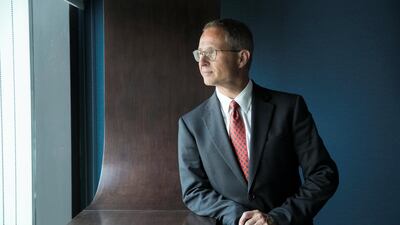Petrochemicals producer Borealis will complete the acquisition of an Austrian plastics recycler over the next couple of weeks, as the company looks to develop more recycled products in Europe and Asian markets, according to its chief executive.
"The transaction is not complete and we're waiting for regulatory approvals...I expect that we can get that in the next couple of weeks," Alfred Stern, chief executive at Borealis, told The National in an interview in Abu Dhabi.
The Austrian chemicals firm, owned by the country’s state-backed producer OMV as well as Mubadala Investment Company is a joint developer with Adnoc of Abu Dhabi’s biggest chemicals facility, Borouge. The company has made a string of acquisitions of plastics recyclers in Europe, capitalising on new European Union regulations to eliminate plastic use.
The EU is working to reach a 60 per cent target for reuse and recycling of plastic packaging by 2030, with 100 per cent earmarked by 2040. To achieve these targets, European organisations from the polymers sector have also embraced the bloc’s push for waste reduction and announced voluntary commitments in January to reach 50 per cent plastics waste recycling by 2040.
Ecoplast Kunststoffrecycling, the Austrian recycler being acquired by Borealis currently processes around 35,000 tonnes of consumer plastic waste into film materials, which can be used in the manufacture of plastic bags.
“It’s different to the first recycling company we acquired in 2016 and there we reprocess both consumer recycled materials into extrusion materials, [which is] more rigid and now with this company that has know-how and technology to build flexible and film materials and we believe that will allow us to develop competence in that area,” said Mr Stern.
Borealis invested 15 million euros (Dh63m) in its 2016 acquisition of German recycler plastics GmbH. The facility, which was inaugurated earlier this year will see additional 2.5m euro investment in capacity expansion and environmental protection.
Borealis, which is currently undertaking a three-fold expansion of polyolefin facilities in Abu Dhabi is also working to bring plastics recycling to the region.
_______________
Read more:
Exclusive: Gulf states consider zero landfill target for plastics by 2040
Exclusive: Borealis seeks partners for joint venture with Adnoc and investments abroad
Business Extra podcast: DP World's row with Djibouti will have far-reaching consequences
_______________
“We will work together as we always do with Borealis and Borouge, and see how can we further capture that, and also in the Borouge markets,” said Mr Stern.
A new business segment for the chemicals producer is the manufacturing of products using recycled plastic as well as virgin polymers. It has recently had some success with the manufacturing of 100 per cent recycled plastics bottles with glue maker Henkel in Europe.
Chemicals manufacturers in the GCC, represented by the Gulf Petrochemicals and Chemicals Association (GPCA) are currently mulling similar targets to Europe to reduce the volume of plastic that ends up in landfills. The National reported in March that the GPCA is considering a zero landfill target for plastics by 2040. The nascent recycling industry has already had some heavyweight investors including Saudi Arabia's Public Investment Fund. The kingdom's sovereign wealth fund has launched a recycling company, with the aim of reprocessing 85 per cent of the country's recyclable wastes, currently being dumped in landfills.
Borealis, which looks to crackdown on marine litter in Indonesia, the second biggest plastic polluter of the seas after China is looking for opportunities to monetise such waste in the region.
“We’ve launched a pilot [in Indonesia], and successfully completed phase one of the pilot,”said Mr Stern.
“How could we turn this into an economic opportunity so it becomes interesting and financeable? That economic opportunity has to have some type of recycling included into it and we teamed up for the phase two with Borouge, so we can drive this faster and have the funding,” he added.


